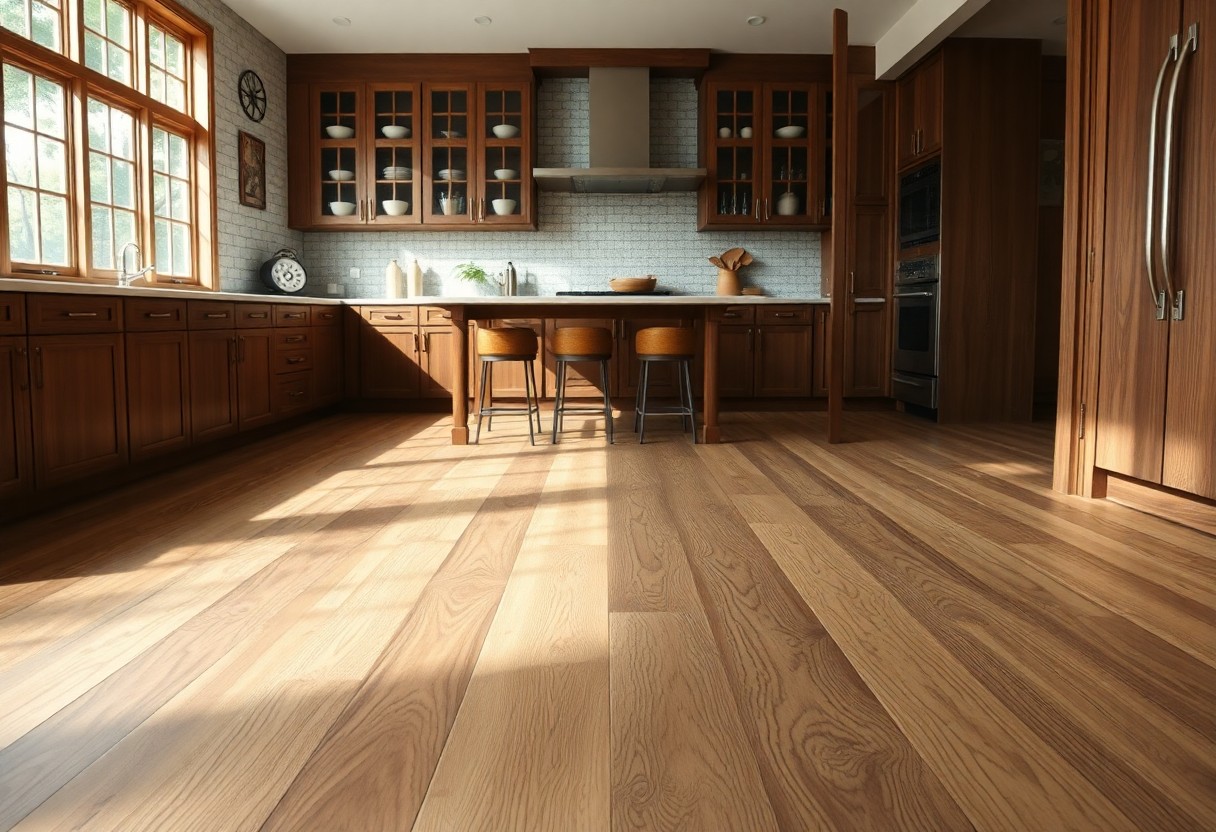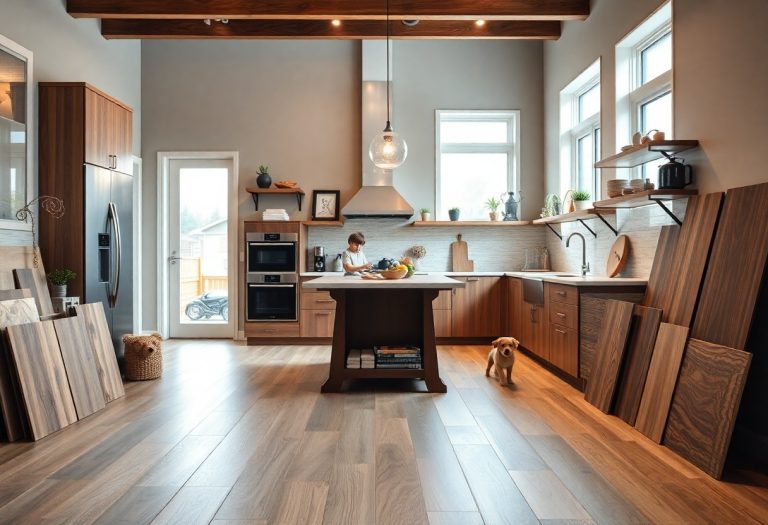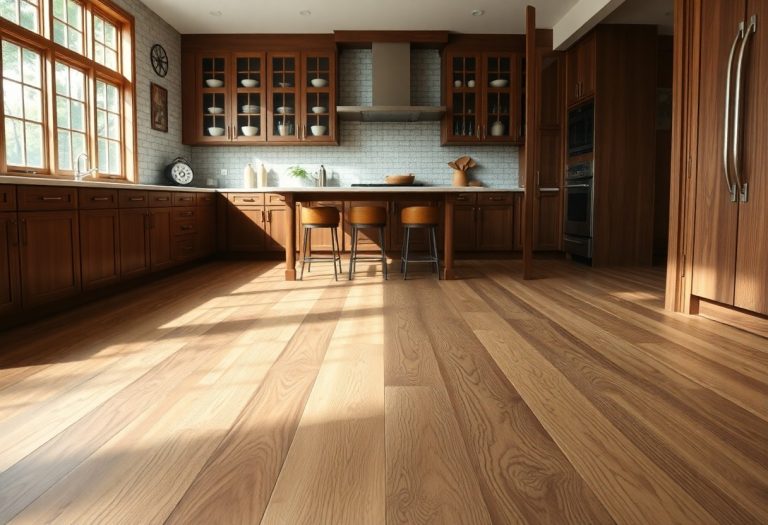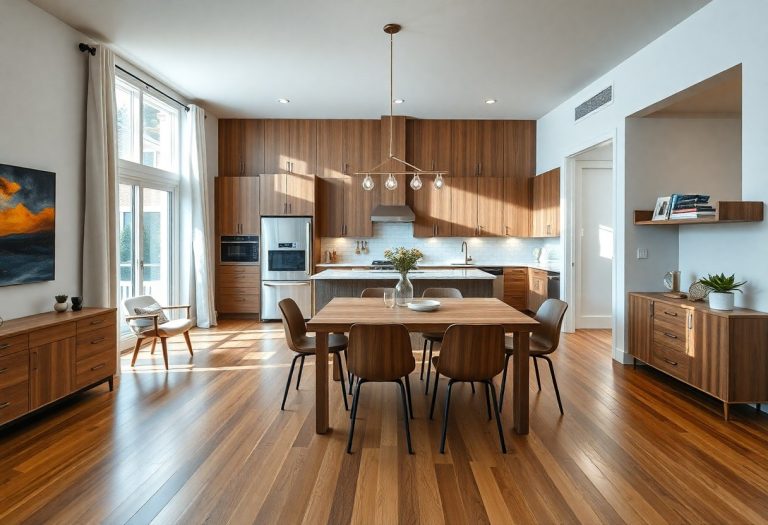Engineered hardwood and solid hardwood are two popular flooring options that can significantly impact the look and feel of your home in Kitchener. As you explore these choices, it’s vital to understand the differences between them, including their construction, durability, installation methods, and maintenance requirements. This guide will equip you with the necessary information to make an informed decision that meets your aesthetic preferences and practical needs for your living space.
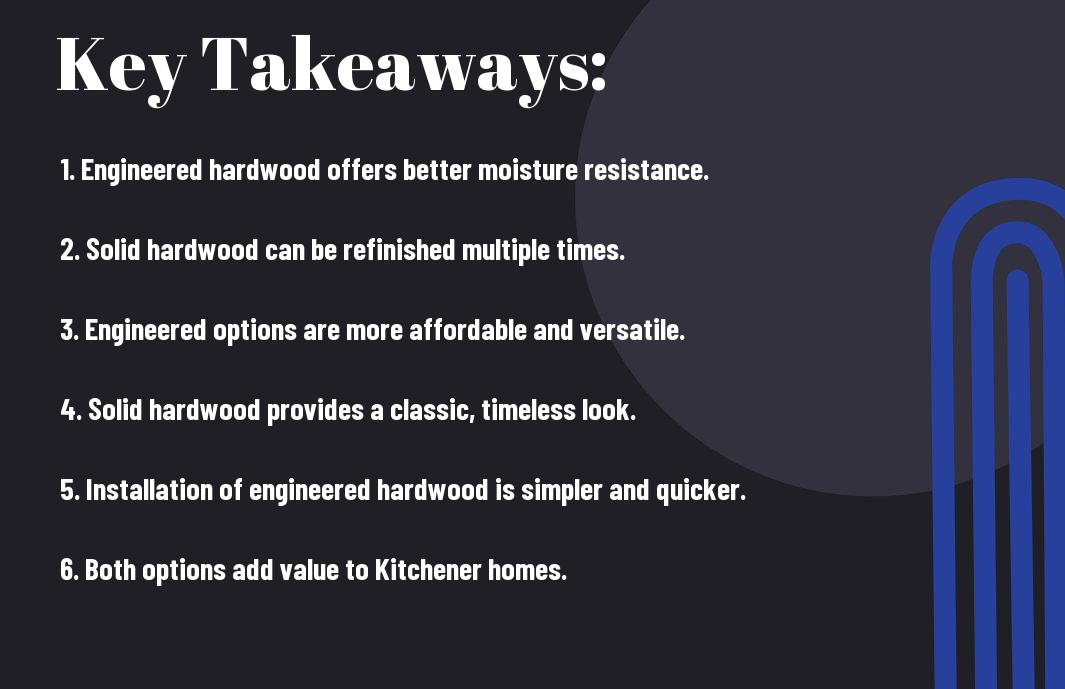
Overview of Hardwood Flooring
Your choice of flooring can greatly impact the aesthetic and functionality of your home. Among the various options, hardwood flooring stands out for its durability and timeless appeal. Both engineered and solid hardwood flooring offer unique benefits, making it vital to understand what each option brings to your space. In this section, we’ll examine into definitions and characteristics that will aid in your decision-making process.
Definition of Engineered Hardwood
Among flooring materials, engineered hardwood consists of multiple layers of wood veneer, which are glued together to form a sturdy base. This design not only enhances its strength but also improves resistance to humidity and temperature changes. As a result, engineered hardwood is often a preferred choice for areas like kitchens and basements, where moisture may be a concern.
Definition of Solid Hardwood
Hardwood flooring refers to planks made from solid pieces of timber. Known for its rich natural appearance and longevity, solid hardwood is often seen as a premium choice for homeowners who desire authenticity and elegance in their interiors. This type of flooring can be sanded and refinished multiple times, thereby extending its lifespan and maintaining its beauty.
Due to its solid construction, hardwood flooring provides a warm and inviting feel while also offering excellent durability. This option is beneficial for high-traffic areas in your home, as it holds up well against wear and tear. If you choose solid hardwood, consider its regional availability, as different types of wood may have varying levels of hardness and resistance to moisture, influencing your decision based on Kitchener’s climate.
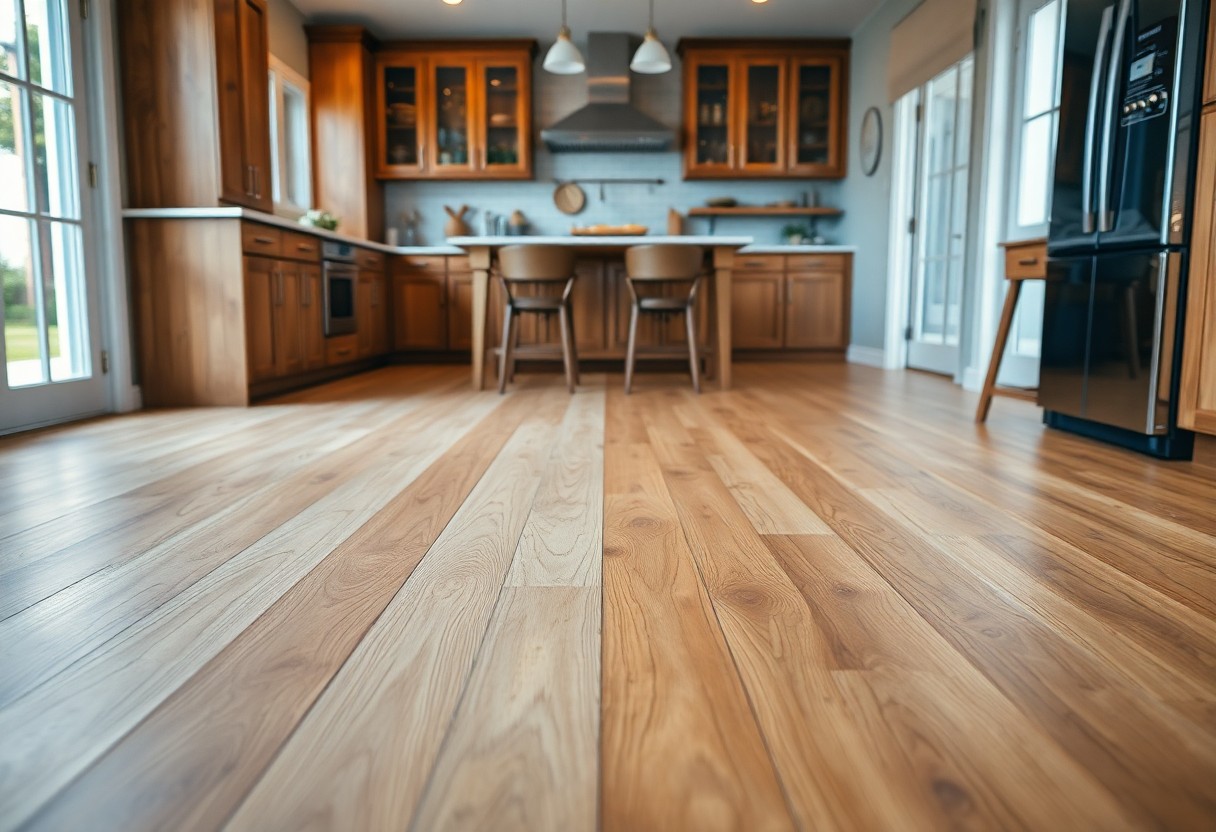
Advantages of Engineered Hardwood
Any homeowner looking for high-quality flooring will appreciate the advantages of engineered hardwood. This flooring option combines the beauty of natural wood with enhanced durability and stability, making it an excellent choice for various environments, including homes in Kitchener. It’s designed to handle fluctuations in temperature and humidity, providing you with a long-lasting and attractive surface that complements your living space.
Moisture Resistance
Above all, moisture resistance is a standout feature of engineered hardwood. This flooring is constructed with a layered design, allowing it to perform better in areas prone to humidity, such as kitchens and bathrooms. The top layer is made of real wood, while the core layers are crafted from plywood or high-density fiberboard, which helps prevent warping and buckling, ensuring your investment remains protected over time.
Cost-Effectiveness
The cost-effectiveness of engineered hardwood makes it a popular choice for many homeowners. With its lower price point than solid hardwood, you can achieve a similar aesthetic without overspending. This makes it a practical option for those looking to enhance their home’s value and appeal without breaking the bank.
Considering the overall value, engineered hardwood offers significant savings not only at purchase but also in maintenance. Its durability means you won’t have to replace it as often as other flooring types, and the easy installation process can reduce labor costs. This makes it an excellent long-term investment for your home, allowing you to enjoy the beauty of hardwood flooring without the hefty price tag associated with solid options.
Advantages of Solid Hardwood
After considering your flooring options, solid hardwood offers numerous benefits that make it an attractive choice for many homeowners. Its timeless elegance and aesthetic charm can enhance the overall feel of any room. Moreover, solid hardwood flooring is made from a single piece of timber, providing a durable solution that can withstand wear and tear over time. Additionally, its ability to be refinished allows for ongoing maintenance and restoration without losing its quality, making it a wise investment for your home.
Aesthetic Appeal
Above all, solid hardwood flooring boasts natural beauty and warmth that can add character to your space. With various wood species, finishes, and grains available, you can easily customize your flooring to match your personal style and home decor. The organic look of hardwood complements both traditional and contemporary designs, providing a versatile foundation for your creative expression.
Durability and Longevity
Against other flooring materials, solid hardwood is renowned for its impressive durability and longevity. With proper care, these floors can last a lifetime, making them an excellent long-term investment for your home.
Due to its dense composition, solid hardwood is less susceptible to damage compared to engineered options. You can expect it to resist wear from foot traffic, making it suitable for high-traffic areas in your home. Additionally, should your floors become scratched or dented over time, solid hardwood can be sanded down and refinished, allowing you to restore its original beauty without needing a complete replacement. This remarkable lifespan and maintainability underscore solid hardwood’s appeal as a flooring choice for Kitchener residents.
Considerations for Kitchener Residents
Once again, when choosing flooring, Kitchener residents should weigh factors like local climate, lifestyle, and budget. Each of these aspects can significantly influence your flooring decision, as some materials perform better in specific environments and suit various lifestyles. Understanding these considerations will empower you to make an informed choice that aligns with your needs.
Climate Impact on Flooring Choices
By taking Kitchener’s variable climate into account, you can select a flooring option that withstands moisture fluctuations and temperature changes. Engineered hardwood is often more resistant to these elements compared to solid hardwood, making it a more suitable choice for areas with high humidity or temperature shifts.
Lifestyle Factors
Choices in flooring should reflect your personal lifestyle and how much wear and tear your floors will endure. Consider the following:
- Do you have pets or children?
- How often do you entertain guests?
- What maintenance level can you commit to?
After assessing these factors, you’ll be better prepared to choose a flooring option that complements your everyday life.
Impact on flooring options also extends to the aesthetic and functional needs of your home. Think about how your flooring choice will align with your interior design preferences and practical requirements. Consider the following:
- Do you prefer a classic or modern look?
- What type of finish do you envision?
- Will the flooring be installed in high-traffic areas?
After evaluating these aspects, you can make a flooring decision that enhances both the beauty and practicality of your space.
Installation and Maintenance
Keep in mind that installation and maintenance requirements vary significantly between engineered and solid hardwood flooring. Engineered hardwood typically allows for quicker installation methods, such as floating or glue-down options, making it a convenient choice for homeowners looking for a speedy renovation process. Solid hardwood, however, usually requires a more traditional nail-down method, which may extend installation time. Choosing the right method can contribute to the overall performance and longevity of your flooring.
Installation Methods
One of the standout features of engineered hardwood is its versatile installation methods. You can opt for a floating floor, where planks interlock without being directly attached to the subfloor, or choose a glue-down option for a permanent bond. Solid hardwood, on the other hand, is typically installed using a nail-down technique, providing a classic and sturdy solution but requiring more labor and time. Consider your project timeline and workflow when making your selection.
Long-term Care Requirements
Methods for maintaining your flooring can differ based on whether you select engineered or solid hardwood. Engineered hardwood requires regular cleaning with a damp mop and periodic re-coating of the finish to protect against wear. Solid hardwood, while similarly requiring routine cleaning, can be sanded and refinished multiple times over its lifespan to rejuvenate its appearance. Your choice of flooring should align with how much time and effort you’re willing to invest in upkeep.
Due to the differences in construction, engineered hardwood is generally more resistant to moisture and humidity changes, making it lower maintenance than solid hardwood. However, solid hardwood’s ability to be refinished means you can extend its life significantly with proper care. Ensure you employ a consistent cleaning regimen and avoid harsh chemicals for both types. Regularly checking for scratches or wear can help you to address issues early on, preserving the beauty and function of your flooring for years to come.
Cost Comparison
Now, understanding the costs associated with engineered and solid hardwood can help you make an informed decision. Below is a breakdown of initial and long-term costs for each flooring option:
Cost Comparison Table
| Flooring Type | Cost Range |
|---|---|
| Engineered Hardwood | $3 – $14 per square foot |
| Solid Hardwood | $8 – $25 per square foot |
Initial Costs
On average, engineered hardwood has a lower initial cost compared to solid hardwood, making it a more budget-friendly option for your kitchen renovation. While engineered options can range from $3 to $14 per square foot, solid hardwood typically falls between $8 to $25 per square foot, reflecting the higher material cost and installation complexity.
Long-term Value
Around long-term investment, solid hardwood usually offers better durability and can be sanded and refinished multiple times, enhancing its lifespan. This means that while the initial cost is higher, it may provide better value if you plan to stay in your home for many years. Engineered hardwood, although less expensive initially, may require replacement sooner, making ongoing costs a factor to consider.
The long-term value of your flooring depends on both lifestyle and the level of maintenance you’re willing to commit to. Solid hardwood stands the test of time, potentially increasing the resale value of your home. Conversely, engineered hardwood may sustain wear, but its limited refinishing capability might not yield the same long-term benefits. Therefore, carefully assess your living situation, including wear from pets or children, to determine which option aligns with your home’s future value and durability goals.
Conclusion
Following this comparison of engineered and solid hardwood flooring, you can now make an informed decision that suits your needs in Kitchener. Each option has its advantages, depending on your lifestyle, budget, and preferences. Engineered hardwood may be ideal for areas with fluctuating humidity, while solid hardwood can offer timeless beauty and long-term value. Consider how each type aligns with your home’s aesthetic and functionality to choose the best flooring solution for you.


